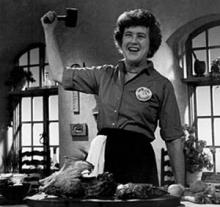Food has always been a big part of television, from the first acts of product placement to the most slick, modern chef competition. Along the way, certain cooking shows have changed the way food is presented on TV and indeed the way people look at the act of cooking. Here are a few programs that revolutionized food on TV.
The French Chef with Julia Child
In 1961, a former Office of Strategic Services officer named Julia Child who served as, among other things, a spy in WWII era France became famous for writing a highly influential cook book called Mastering the Art of French Cooking. Being the Anglophone member of the three-person editorial team for the book, Julia promoted it in America where she eventually found herself on an educational talk show on public television. Her culinary skill and TV-friendly demeanor led Julia Child to create one of the first shows dedicated to cooking in TV history. The French Chef with Julia Child became the foundation on which all other cooking shows are built. Charming, informative and without frills, Child's first foray into television created a genre unto itself.
Emeril Live with Emeril Lagasse
Cooking shows didn't change much between 1963 and the mid 1990's when cable opened up the medium with higher budgets for niche programming. One among a new wave of genre-specific channels was The Food Network, a 24-hour network dedicated to cooking, dining and the science of food. One of its flagship programs and arguably the one to keep the network alive in its first couple years was Emeril Live, a boisterous take on the cooking show format that capitalized on chef Emeril Lagasse's larger than life personality. Lagasse cooked for a large studio audience and bantered with them during the entire fast-paced program, democratizing cooking and turning it into a celebration.
Ryori no Tetsujin (Iron Chef)
In 1993, Japanese TV station Fuji Television premiered Iron Men of Cooking, known in America as Iron Chef. The show was a smash hit and after seven seasons it found new life with a dubbed American release and soon after a complete adaptation in several different countries. Iron Chef comes from a completely different television tradition than most American cooking shows. Instead of trying to bring the art of cooking to an accessible viewer level, it fetishizes gourmet cuisine and elevates those who prepare it to heroic status. The flashy, high-budget format of Iron Chef exemplifies the Japanese obsession with rare and unusual food, all while taking what is usually such a low-key affair and transforming it into a riveting sporting event.
Good Eats
Host Alton Brown has a background in the technical aspects of television that predates his culinary education. His lovably ramshackle show Good Eats mixes the usual ingredient and technique format of cooking shows with the inventive science content of Bill Nye. Relentlessly energetic and thoroughly entertaining, Brown makes both food and learning into one of the most fun experiences on modern television, and has since 1999.
Ramsay's Kitchen Nightmares
Chef Gordon Ramsay is known as much for his foul mouth and short temper as he is for his cooking expertise, but that's what makes the original BBC version of Kitchen Nightmares so interesting. The show is only half about the food itself while the rest is about the brass tacks of running a proper restaurant. Ramsay's drill sergeant routine puts a fine point on the hard work, know-how and common sense of fine dining, more so than in any other show on TV.
